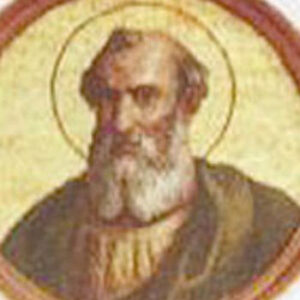
Pope Victor I
*The birth of Pope Victor I is affirmed on this date in c 169. He was a Roman African bishop prelate of the early Christian Church who was Bishop of Rome in the late second Century.
He was born in the Roman Province of Africa in Leptis Magna, present-day Libya. He was of Berber origin. The primary sources vary over the dates assigned to Victor's episcopate but indicate it included the last decade of the second Century. Eusebius puts his accession in the tenth year of Commodus (i.e., A.D. 189), which Lipsius accepts as the correct date. Jerome's version of the Chronicle puts his accession in the reign of the first year of Septimius Severus (i.e., 193).
In contrast, the Armenian version puts it in the seventh year of Commodus (186). The Armenian version of Eusebius' Chronicle gives it 12 years. Lipsius, considering Victor in connection with his successors, concludes that he held office between nine and ten years and therefore gives as his dates 189–198 or 199. According to some, Victor excommunicated Theodotus of Byzantium for teaching that Christ was a mere man. However, he is best known for his role in the Quartodeciman controversy.
Before his elevation, both the Roman and Eastern churches tolerated a difference in the date of the Christian Passover/Easter celebration between Rome and the bishops of Asia Minor. The churches in Asia Minor celebrated Easter on the 14th of the Jewish month of Nisan, the day before Jewish Passover, regardless of what day of the week it fell on, as the Crucifixion had occurred on the Friday before Passover, justifying this as the custom they had learned from the apostles; for this, the Latins called them Quartodecimans.
Synods were held on the subject in various parts—in Judea under Theophilus of Caesarea and Narcissus of Jerusalem, in Pontus under Palmas, in Gaul under Irenaeus, in Corinth under its bishop, Bachillus, at Osrhoene in Mesopotamia, and elsewhere—all of which disapproved of this practice and consequently issued by synodical letters declaring that "on the Lord's Day only the mystery of the resurrection of the Lord from the dead was accomplished, and that on that day only we keep the close of the paschal fast" (Eusebius H. E. v. 23).
Despite this disapproval, the general feeling was that this divergent tradition was insufficient grounds for excommunication. Victor alone was intolerant of this difference and severed ties with these ancient churches, whose bishops included Polycrates of Ephesus; in response, he was rebuked by Irenaeus and others, according to Eusebius. He was later considered a saint. His feast day is July 28 as "St Victor I, Pope and Martyr." Pope Victor I died in 199.